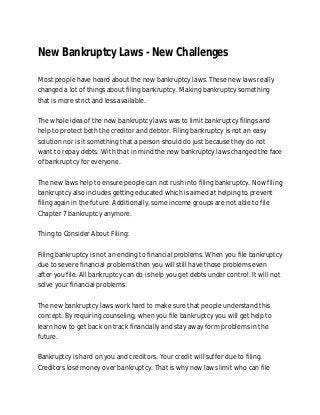
New Bankruptcy Laws - New Challenges
- 1. New Bankruptcy Laws - New Challenges Most people have heard about the new bankruptcy laws. These new laws really changed a lot of things about filing bankruptcy. Making bankruptcy something that is more strict and less available. The whole idea of the new bankruptcy laws was to limit bankruptcy filings and help to protect both the creditor and debtor. Filing bankruptcy is not an easy solution nor is it something that a person should do just because they do not want to repay debts. With that in mind the new bankruptcy laws changed the face of bankruptcy for everyone. The new laws help to ensure people can not rush into filing bankruptcy. Now filing bankruptcy also includes getting educated which is aimed at helping to prevent filing again in the future. Additionally, some income groups are not able to file Chapter 7 bankruptcy anymore. Thing to Consider About Filing: Filing bankruptcy is not an ending to financial problems. When you file bankruptcy due to severe financial problems then you will still have those problems even after you file. All bankruptcy can do is help you get debts under control. It will not solve your financial problems. The new bankruptcy laws work hard to make sure that people understand this concept. By requiring counseling, when you file bankruptcy you will get help to learn how to get back on track financially and stay away form problems in the future. Bankruptcy is hard on you and creditors. Your credit will suffer due to filing. Creditors lose money over bankruptcy. That is why new laws limit who can file
- 2. Chapter 7 bankruptcies which wipe away debt and instead enforce filing of Chapter 11 where debts are repaid. Income Limits: The new bankruptcy laws require a means test which will determine the income of the filer. If the income level is deemed high enough a person will have to file Chapter 11 and repay debts. Lower income filers will still be able to file Chapter 7. The means test weighs a variety of factors to determine if a person can afford to repay debts under a court sanctioned repayment process. Counseling Requirements: The counseling requirements of the new bankruptcy laws are in place to help ensure that everyone filing bankruptcy understands the process and understands the importance of getting their personal finances under control. The counseling sessions are required before filing and then again before the bankruptcy is finalized. These classes are mandatory no matter what type of bankruptcy is being filed.
